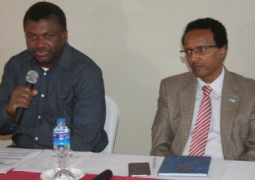The seminars offer an opportunity for the participants to identify and study the problems of statelessness in West Africa and Africa at large.
Stateless people are people who are not considered as nationals of any state in the world.Stateless people are different from refugees – those people that fled their country of nationality due to war, political instability, or for some other reasons.
Statistics indicate that there are about 10 million stateless persons in the world.About 750,000 of these are in West Africa alone.Almost 60 per cent of the 10 million stateless people are children.
Statelessness is certainly a huge problem not only because of the numbers involved, but also because of its implications and effects on the lives and livelihood of the people affected.
A stateless person has no legal bond between him or her and any state.In essence, the person has no nationality and without a nationality participation in society and the protection of one’s human rights is severely affected.
No country is legally obliged to recognise someone without a nationality. Usually, stateless people have no passport or other identity document.They sometimes face forced displacement caused by lacking the right documents to stay in a country.
UNHCR experts say there are thousands of stateless persons in prison everywhere in the world, for not possessing a nationality. They are seen as illegal immigrants wherever they go.
Besides, a stateless person has no right to vote or be voted for into public office, resulting in no rights to participate in political processes.
In addition, a stateless person is generally not able to sign a legal contract because such a person has no formal legal right.Consequently, it may be very difficult if not impossible for a stateless person to own properties like land and a vehicle legally, because in many countries to buy such properties one needs certain identification.
Also, to enjoy services such as banking and insurance is virtually impossible for a stateless person, because such services are a form of a legal contract which no institution will enter into with a person without a legal identity.
States, as the primary duty bearers, need to act to prevent statelessness, and should it happen it is incumbent upon them to protect the rights and welfare of such people.
Therefore, political will at the highest level of any government is essential in this endeavour.
In The Gambia, the government has demonstrated the political will as manifested by its recent ratification of the two UN conventions on statelessness -the 1954 Convention relating to the Status of Stateless Persons, and the 1961 Convention on the Reduction of Statelessness, recently.
Better late than never, the government’s move to ratify the convention - more than 50 years after the conventions came into being - is an indication that they have now noticed the very serious consequences of statelessness.This is as a result of a better understanding of the issue now.
Therefore, we are calling on the UNHCR to do more of such programmes with different stakeholders, in order to continually inform policymakers and build civil society and government capacities to deal with statelessness.
In this way, the issue will remain on the agenda of all stakeholders to find solutions to statelessness, as all are born equal and with the same human rights.
“To deny people their human rights is to challenge their very humanity.”
Nelson Mandela
Read Other Articles In Article (Archive)
Commonwealth Handball Men Championship Ends in Nigeria
Oct 15, 2008, 7:28 AM



